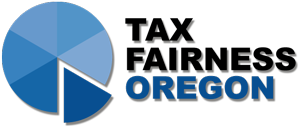FOR IMMEDIATE RELEASE – May 25, 2011
Contact:
- Larry Scruggs, larrygscruggsphd@aol.com, 503 317-4968
- Jody Wiser, jodywiser@gmail.com, 503 810-6654
- Shannon Moriarty, smoriarty@faireconomy.org, (617) 824-0069
Report: Invert State Tax Structures To Eliminate State Budget Deficits
United for a Fair Economy Releases Flip It to Fix It:
An Immediate, Fair Solution to State Budget Shortfalls,
Documents Current Regressive State Tax Structures
Salem, Oregon (May 25, 2011):
“Flip it to Fix it,” a new study released by United for a Fair Economy, found that $1.8 billion a year could be available to Oregon, if only we could flip our taxes, and expect the highest income Oregonians to pay what the lowest now pay in local and state taxes. It’s hard to imagine the push back if legislators tried to do this, but why aren’t the poorest Oregonians pushing for it?
By inverting all local and state taxes, the highest income earners would start paying 8.7% of their income in taxes as currently do the lowest income earners. In turn, the lowest 20% would pay 7.3%, which the highest income earners currently pay.
Taxes for the bottom 50 percent of households would be reduced or unchanged. Meanwhile state and local revenue for Oregon would see a 14.5% increase, immediately avoiding the serious consequences of most budget cuts for cities, counties, schools and the state.
“Flip It to Fix It: An Immediate, Fair Solution to State Budget Shortfalls” attributes a large part of states’ current deficits to the regressive tax structures that the report shows are designed to fail. “Trying to raise adequate revenue through a regressive tax structure—where a greater percent of income is demanded of the poor than the well-off—is like trying to squeeze water from a stone,” said Karen Kraut, coordinator of state tax policy at United for a Fair Economy and co-author of the report.
In Oregon the lowest income 20% pays 8.7% in state and local taxes while the highest income 20% pays 7.3%. Yet while draconian cuts are being made to budgets, a bill reducing estate taxes is moving forward in Salem. “Obviously, making it so that only one half of 1% of estates pays the estate tax would only make matters worse,” testified Larry Scruggs, a member of Tax Fairness Oregon Monday at a Senate Finance and Budget Committee meeting on HB 2541A, which would give a tax break to 75% of estates. “Letting even fewer pay the estate tax is no more sensible than creating a tax break for capital gains — each of these would only make our regressive tax system worse.”
“The inadequacy of regressive tax structures puts everything we value at risk: the well-being of families, the future competitiveness of the American workforce, and the nation’s ability to rebound from the recession and prosper,” said Kraut.
The report contends that an inverted tax structure not only solves budget crises, but increases equity and spurs steady and strong economic activity.
“We would not be making steep cuts in services, closing schools or laying off teachers if our tax system were just flipped,” according to Peggy Woolsey. “Those of us at Tax Fairness Oregon believe that to be equitable, taxes should weigh more heavily on those with higher incomes. But as this report shows, it’s the opposite way around. The lowest income Oregonians pay a larger portion of their income in state and local taxes than do the highest income.”
The report calls on states to adopt its proposed progressive tax reforms, many of which are immediately achievable and will help solve state deficits.
The full report and state-by-state information is now available at http://www.faireconomy.org/flipitreport.
To schedule an interview with the authors of the study, please contact Shannon Moriarty at smoriarty@faireconomy.org or (617) 824-0069.
Oregonians available are: Larry Scruggs, larrygscruggsphd@aol.com, 503 317-4968
and Jody Wiser, jodywiser@gmail.com, 503 810-6654
Video statements are also available at http://www.faireconomy.org/flipitreport.
###
Tax Fairness Oregon advocates for fair, adequate and stable taxes. Active daily in the state capitol during legislative sessions, Tax Fairness Oregon’s volunteers address tax issues on the federal as well as state level the rest of the year. We are a partner of United for a Fair Economy through its program, the Tax Fairness Organizing Collaborative, a network of statewide organizations in 24 states working to reduce economic inequality through progressive tax reform. More at www.TaxFairnessOregon.org.
United for a Fair Economy is a national, independent, nonpartisan, 501(c)(3) non-profit organization located in Boston, MA, which works to rein in economic inequality and promote a more broadly shared prosperity. More at www.faireconomy.org.

